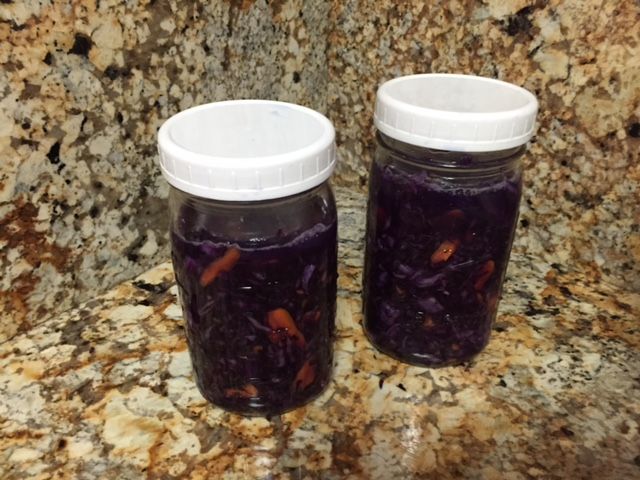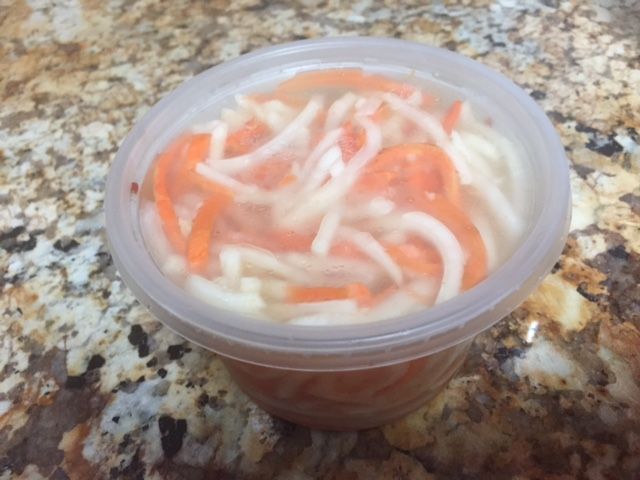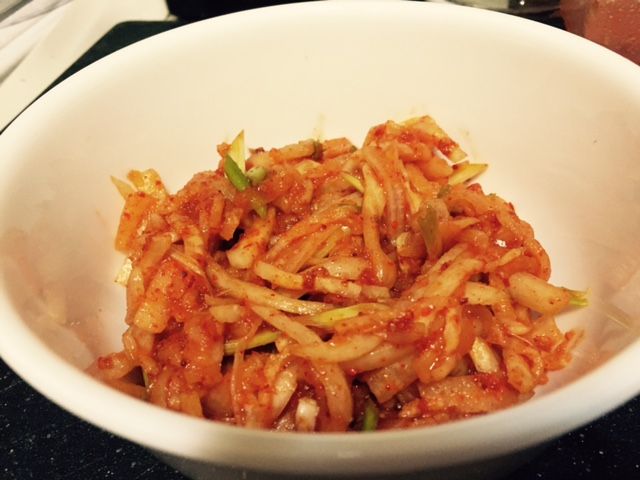
Aloha, patty
Moderators: JeffN, f1jim, John McDougall, carolve, Heather McDougall
Timaca wrote:Well, probiotics have allowed me to eat more food again. I was having significant GI pain such that eating was problematic for me. I was getting way too thin. Probiotics have helped me a lot. Things aren't perfect, but they are much better. My heartburn is also much less. So, for me, they have been very, very useful.

JuicerJohn wrote:Hi Patty,
I am wanting to try beet and cabbage as well, so please let me know how it turns out. I am also curious to try beet kvass, a probiotic drink made from red beets. Google or search on YouTube if you are not familiar. It is another good healer, right up there with sauerkraut from what I have read and heard.
JuicerJohn wrote:I also think of all the great photo-nutrients you get from red cabbage and dark red beets. And since the veggies are raw, none of them are destroyed by heat. And since the action of the bacteria partially pre-digests the food, not only are more of the photo-nutrients available to our bodies, but many more of the minerals as well. And, as an added benefit, many of the bacterial strains create B vitamins as well.
Internet is also an increasingly massive exercise in inventing democracy anew, and quite possibly the most significant influence in changing human society at the dawn of this new millennium. Chapter 20 describes the inherent organizational design and operating principles of this new Web as those of living systems, and thus shows why it has the power to force corporations with organizational designs and operating principles based on command and control mechanics to change their ways— to become more like living systems themselves. As corporations, which play such a powerful determining role in our species’ behavior as a whole, are transformed into abiding by the sustainable survival principles of living systems, their goals will necessarily come into harmony with our personal and community goals. We can then mature like other species from competition to cooperation and build a human society in which the goals of individual and community, of local and global economy, of economy and ecology are met. This will shift us out of crises and into the happier, healthier world of which we all dream. Let it be so! Elisabet Sahtouris, September, 2000
Sahtouris, Elisabet (2012-02-02). EarthDance: Living Systems in Evolution (Kindle Locations 185-193). . Kindle Edition.
The conclusion reached in this book, that we humans as a species must learn quickly to fit our lifestyles harmoniously into the rest of nature, is what led me to seek out indigenous knowledge between editions. Indigenous peoples never saw themselves as anything but an integral part of nature, and so they tend to know much more about that than do industrial peoples. Once, I listened to Jeannette Armstrong, a wise woman of the Okinakan nation, which still lives traditionally, speaking in detail about her peoples’ understanding of nature. It was precisely the understanding I had gained in the course of writing this book far off on a Greek island— confirmation to me that I had gotten it right, for her people had the credibility of thousands of years of careful and scientific observation.
The immense knowledge of nature, the coherent philosophies and the non-technological achievements of indigenous people impressed me deeply. They have observed us far more carefully than we have them. Their conscious choice not to develop technological consumer societies gave me a more balanced view of human life and some valuable insights I have shared in several new chapters. One of these insights— that there can no more be one true science than one true religion— was difficult to share with fellow scientists of my industrial culture. Almost invariably, they responded, “You mean indigenous knowledge; they don’t have science, there is only one science.” I have therefore taken some care to show that indigenous people do indeed have science, by our own definitions, as a deep aspect of their cultures (see Chapter 19).
The great effort of industrial culture to fragment our world, to separate science, religion, art, economics, politics and other social practices, has long seemed to me very costly in blinding us to their interrelations. Today this is expressed in such problems as the difficulty of integrating the economy with ecology, two words meaning, in their original Greek, the organizational design and the operating principles of a household. Clearly they should never have been separated! How could it have happened? As Janine Benyus pointed out in a speech at a Bioneers conference, we assigned one group of people— biologists— to study how other species make a living, and another unrelated group of people— economists— to determine how humans make a living. Only now do we see interest in living systems enter the world of business.
Indigenous people have also taught me that good science can be done without tearing it out of the seamless and sacred fabric of life. They have always known this is a participatory universe, which Western scientists only now acknowledge. We simply cannot observe it without changing it. Indigenous people understand science and spirituality as aspects of the same reality— an intelligent, conscious continuum with physical and non-physical aspects. They are aware that all parts and aspects of nature are in constant nonphysical communication. In Western science, physicists only now discover the deep connectedness and dialogue of everything through concepts of non-locality and zero-point energy.
One crisp cool day in a cornfield on the barren Hopi reservation in Arizona, I watched Martin Gashweseoma— now almost the only traditional Hopi elder still alive— kneeling in the dry earth beneath a brilliant blue sky, picking dried ears of blue corn from the stubby plants rustling in a cold late fall wind. Martin continues to live in the sacred way, with only the digging stick given by the Great Spirit, Maasau, along with instructions for living in peace and simplicity. He stood up to greet me and began speaking of the eviction of the faithful Hopi from Old Oraibi in 1906 with only what they could carry, of his uncle Yukiuma who led his people like Gandhi on this exodus, even going to the White House to plead their cause, of the sacred stone tablets his uncle later entrusted to him, of the way they were taken away, of the Day of Purification the white man, Bahanna, is bringing on, with all its suffering as the world becomes desert…
What he said was familiar, as I had been working with the Hopi and other Indians for years by this time, but it took on new significance as it burned into my heart on that crisp, clear fall day, the azure sky blazing behind him as we talked. Three men who had brought me to the field stood behind me and never interrupted; Martin did not take his eyes from mine during our long interchange. It was an experience of total undivided attention I, as a woman, had never experienced from men. The intense energy flowing between Martin and myself created a dense whirlpool tangible even to me, a person normally insensitive to such things. A whirlpool, as I say in this book, is a living entity, and Martin wove such an entity.
Anguish flowed through me at his despair. He spoke of his and other elders’ failure to reach the White Brother— our dominant culture— with the Hopi Prophecy, and of how even the Hopi were abandoning their traditions, their cornfields. The Hopi prophecy, discussed at the beginning of Chapter 19, says the world as we know it will end if the White Brother does not heed the Sacred Way of the Red Brother and share his mission to develop technology in that spirit.
His truth— the need for cooperation between the ways of indigenous and industrial peoples to build a sustainable world— is vital to our survival. I found this same truth over and over again in many teachings I have gained from indigenous peoples in many places. I explored this truth in many contexts, from presidential commission dialogues on a sustainable human future in Washington DC to traditional villages in the Peruvian Andes, where I spent a whole year studying the cosmology and science of ancient Andean cultures, and now in the corporate world of multinationals, the most powerful organizations humanity has yet devised.
This corporate world, which, along with science and technology, is often blamed for current crises, is suddenly in crisis itself because of a dramatic new development on the human scene: the Internet. From my perspective as an evolution biologist, this WorldWideWeb of information exchange is a kind of fractal biology repeat pattern of the first version, built by bacteria billions of years ago, as we see in Chapter 4. And just like its ancient counterpart— still in existence among bacteria worldwide today— it is a self-organizing living system. This Internet is also an increasingly massive exercise in inventing democracy anew, and quite possibly the most significant influence in changing human society at the dawn of this new millennium.
Chapter 20 describes the inherent organizational design and operating principles of this new Web as those of living systems, and thus shows why it has the power to force corporations with organizational designs and operating principles based on command and control mechanics to change their ways— to become more like living systems themselves. As corporations, which play such a powerful determining role in our species’ behavior as a whole, are transformed into abiding by the sustainable survival principles of living systems, their goals will necessarily come into harmony with our personal and community goals. We can then mature like other species from competition to cooperation and build a human society in which the goals of individual and community, of local and global economy, of economy and ecology are met. This will shift us out of crises and into the happier, healthier world of which we all dream. Let it be so! Elisabet Sahtouris, September, 2000
Sahtouris, Elisabet (2012-02-02). EarthDance: Living Systems in Evolution (Kindle Locations 185-193). . Kindle Edition.
Miso is another fermented whole soy food. This thick paste is commonly mixed with hot water to make a delicious soup that’s a staple in Japanese cuisine. If you want to give it a try, I suggest white miso, which has a mellower flavor than red miso. Making miso soup can be as easy as mixing one tablespoon of miso with two cups of hot water and whatever vegetables you prefer. That’s it! Because miso may contain probiotic bacteria, 19 it’s probably best not to actually cook the miso, lest the good bugs be wiped out. When I prepare it, I boil dried mushrooms, a pinch of arame seaweed, a few sun-dried tomatoes, and greens in a pot and ladle off about a quarter cup of hot broth into a large bowl, add the miso, and mash it with a fork until only a thin paste remains. I then pour the rest of the soup into the bowl and stir to combine it with the miso. And, because I’m a bit of a hot-sauce freak, I add some Sriracha for a little kick. My new favorite addition is freshly toasted sesame seeds. I pour out a layer of raw, hulled sesame seeds, put them in the toaster oven until they just start to turn golden, and then throw them sizzling into the soup. Makes
Greger, Michael, MD; Stone, Gene (2015-12-08). How Not to Die: Discover the Foods Scientifically Proven to Prevent and Reverse Disease (p. 280). Flatiron Books. Kindle Edition.
JuicerJohn wrote:Without probiotics, it is unlikely we would even be here.
In any climate where foods cannot be grown year-round, people without modern refrigeration had two choices, either work with existing bacteria in a way that food is preserved (fermentation) or allow other bacteria to spoil food and make it inedible. Not a very nice thing to have happen in the dead of winter when you and your family are hungry.
So, basically, you could say that probiotic preservation of food allowed man to move out of the equatorial zone and into more temperate climates.
In today's world, we are subject to many pressures on the natural gut biome. Air pollution, water pollution, chemicals used in cleaning and hygiene products, etc., all have an impact on the natural bacteria that are growing inside of us and are absolutely necessary to our health.
You may be absolutely certain of your gut health, but how do you know for sure?
Like Timaca, I came to fermented foods for health reasons. I have been WFPB for over 3 years now, and yet, during that time my problems with acid reflux have worsened. I am finding that eating naturally fermented sauerkraut a few times a day has largely reversed that negative trend, and I have nearly cut out my use of antacids, which was getting high enough that I was very concerned about it.
And besides, if you have never tasted naturally fermented sauerkraut, you don't know what you are missing! Now that I know about it and have the ability to make it as well as pickles, fermented carrots, etc. I would be doing it whether I had digestive problems or not. The food is just that good!


Users browsing this forum: No registered users and 8 guests